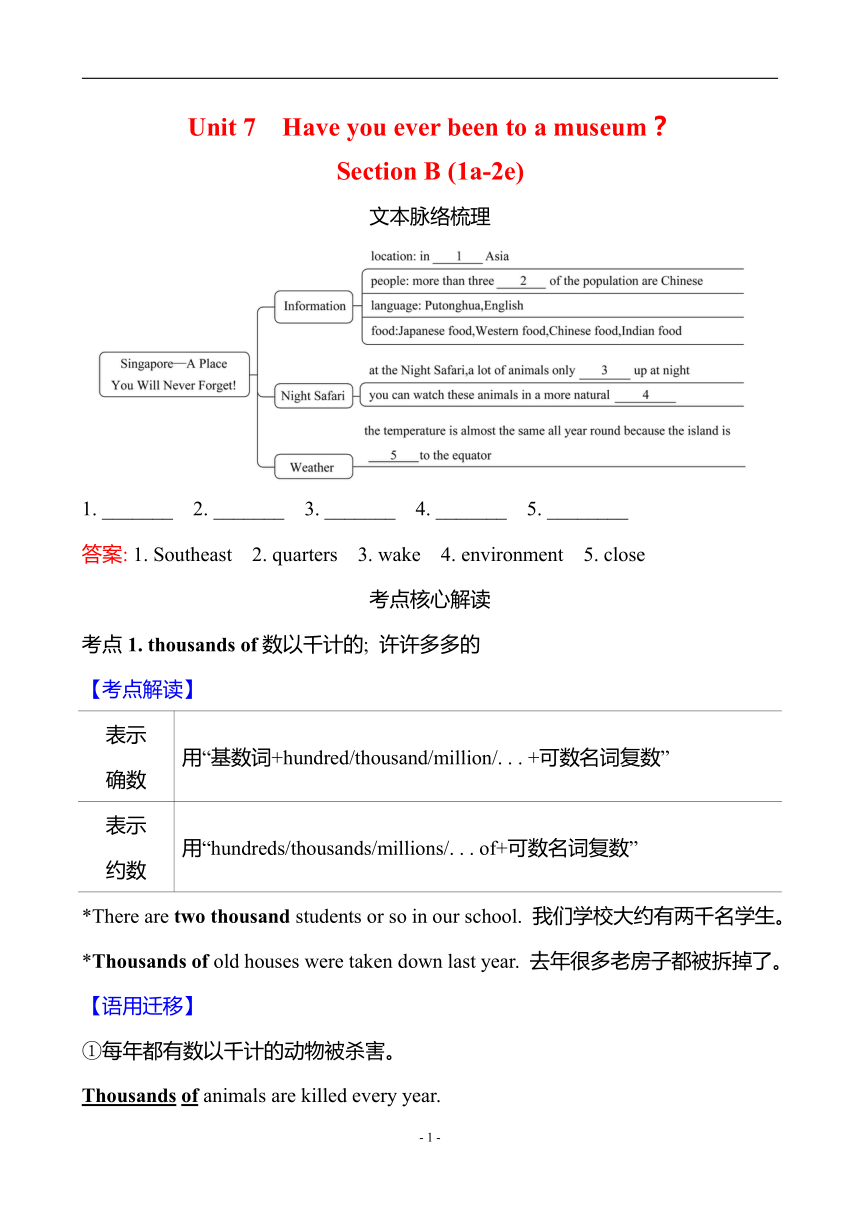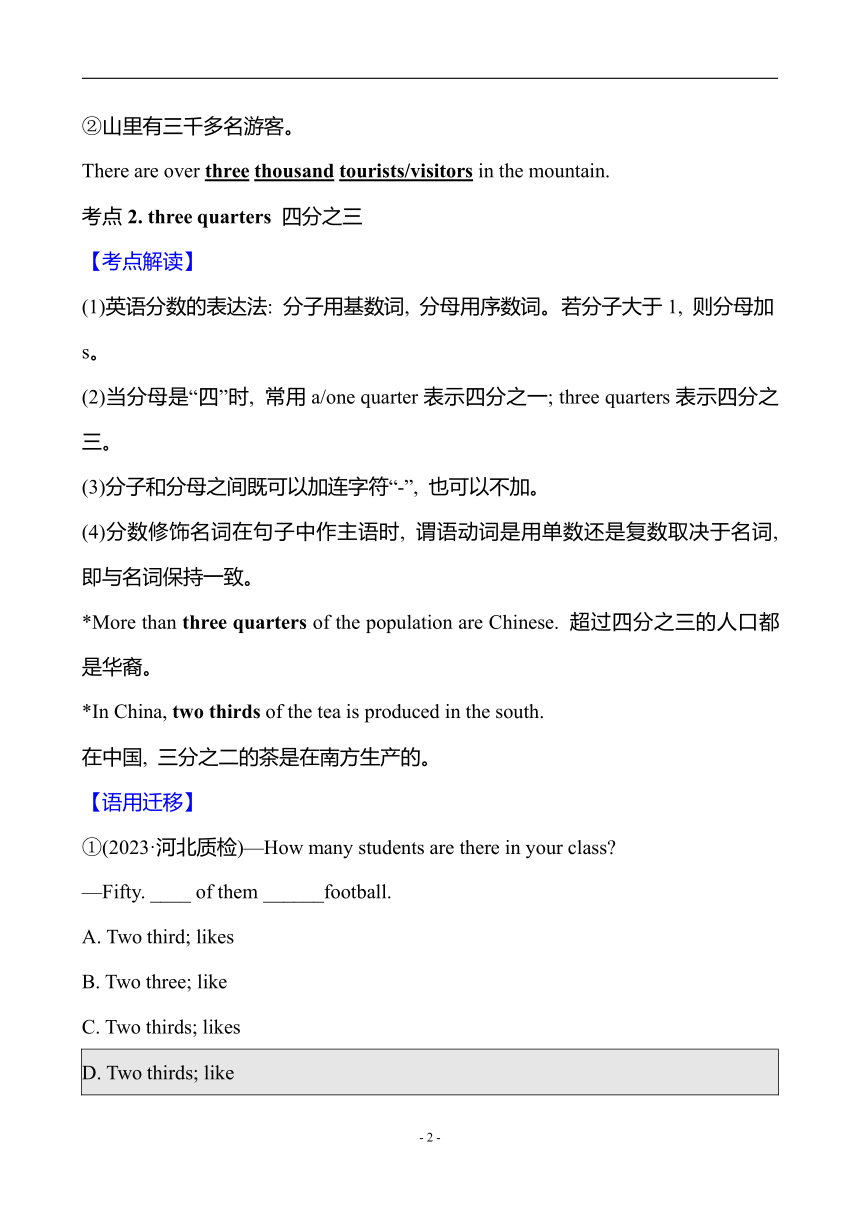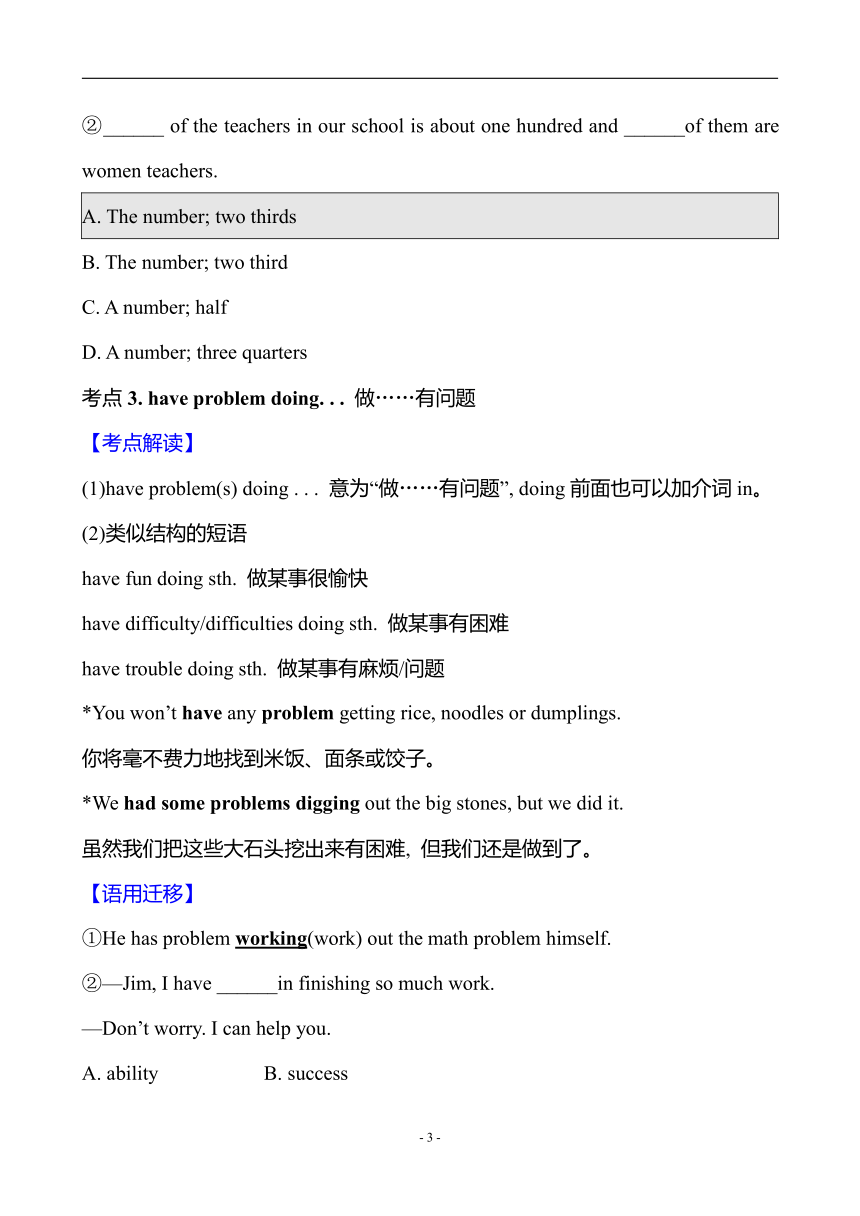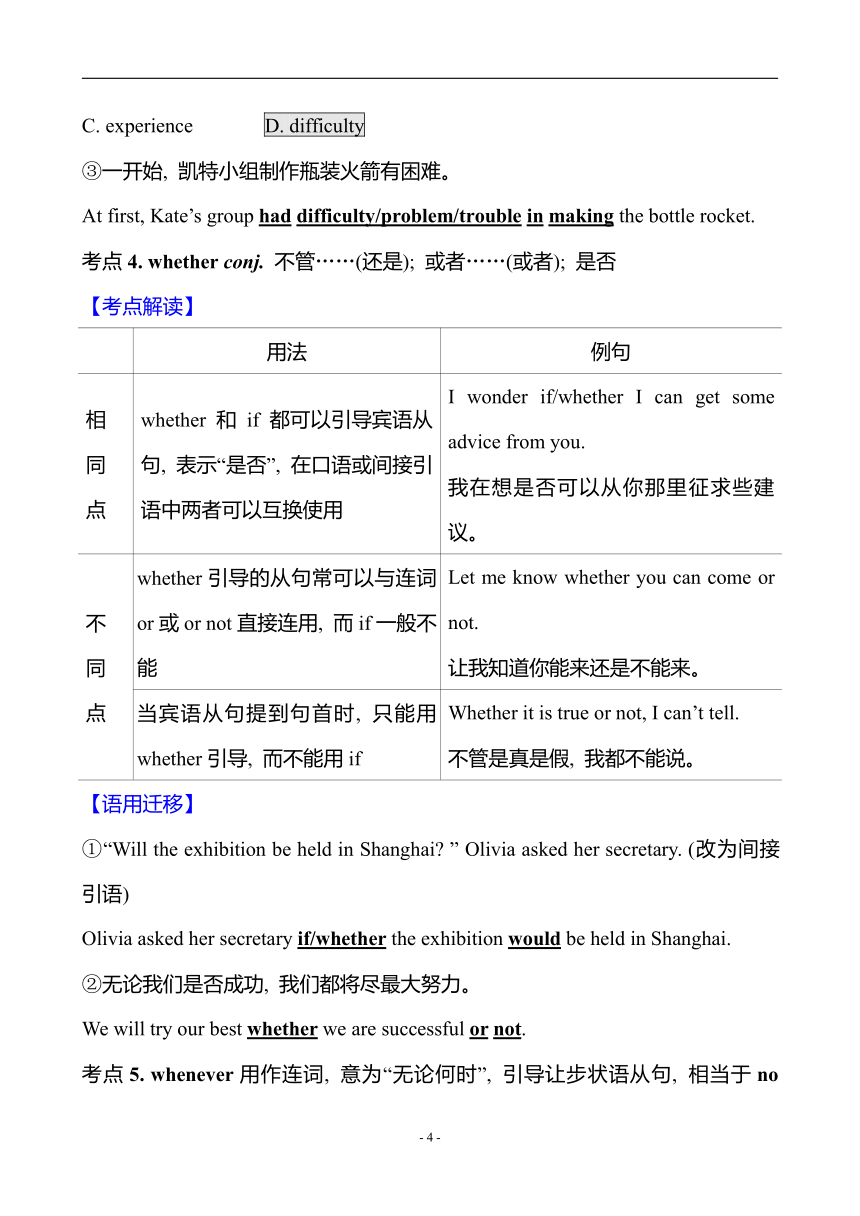Unit 7 Have you ever been to a museum?Section B (1a-2e) 学案(含答案) 2024-2025学年英语鲁教版八年级上册
文档属性
| 名称 | Unit 7 Have you ever been to a museum?Section B (1a-2e) 学案(含答案) 2024-2025学年英语鲁教版八年级上册 |

|
|
| 格式 | docx | ||
| 文件大小 | 155.2KB | ||
| 资源类型 | 教案 | ||
| 版本资源 | 鲁教版 | ||
| 科目 | 英语 | ||
| 更新时间 | 2024-06-13 17:27:55 | ||
图片预览




文档简介
Unit 7 Have you ever been to a museum?
Section B (1a-2e)
文本脉络梳理
1. _______ 2. _______ 3. _______ 4. _______ 5. ________
答案: 1. Southeast 2. quarters 3. wake 4. environment 5. close
考点核心解读
考点1. thousands of数以千计的; 许许多多的
【考点解读】
表示 确数 用“基数词+hundred/thousand/million/. . . +可数名词复数”
表示 约数 用“hundreds/thousands/millions/. . . of+可数名词复数”
*There are two thousand students or so in our school. 我们学校大约有两千名学生。
*Thousands of old houses were taken down last year. 去年很多老房子都被拆掉了。
【语用迁移】
①每年都有数以千计的动物被杀害。
Thousands of animals are killed every year.
②山里有三千多名游客。
There are over three thousand tourists/visitors in the mountain.
考点2. three quarters 四分之三
【考点解读】
(1)英语分数的表达法: 分子用基数词, 分母用序数词。若分子大于1, 则分母加s。
(2)当分母是“四”时, 常用a/one quarter表示四分之一; three quarters表示四分之三。
(3)分子和分母之间既可以加连字符“-”, 也可以不加。
(4)分数修饰名词在句子中作主语时, 谓语动词是用单数还是复数取决于名词, 即与名词保持一致。
*More than three quarters of the population are Chinese. 超过四分之三的人口都是华裔。
*In China, two thirds of the tea is produced in the south.
在中国, 三分之二的茶是在南方生产的。
【语用迁移】
①(2023·河北质检)—How many students are there in your class
—Fifty. ____ of them ______football.
A. Two third; likes
B. Two three; like
C. Two thirds; likes
D. Two thirds; like
②______ of the teachers in our school is about one hundred and ______of them are women teachers.
A. The number; two thirds
B. The number; two third
C. A number; half
D. A number; three quarters
考点3. have problem doing. . . 做……有问题
【考点解读】
(1)have problem(s) doing . . . 意为“做……有问题”, doing前面也可以加介词in。
(2)类似结构的短语
have fun doing sth. 做某事很愉快
have difficulty/difficulties doing sth. 做某事有困难
have trouble doing sth. 做某事有麻烦/问题
*You won’t have any problem getting rice, noodles or dumplings.
你将毫不费力地找到米饭、面条或饺子。
*We had some problems digging out the big stones, but we did it.
虽然我们把这些大石头挖出来有困难, 但我们还是做到了。
【语用迁移】
①He has problem working(work) out the math problem himself.
②—Jim, I have ______in finishing so much work.
—Don’t worry. I can help you.
A. ability B. success
C. experience D. difficulty
③一开始, 凯特小组制作瓶装火箭有困难。
At first, Kate’s group had difficulty/problem/trouble in making the bottle rocket.
考点4. whether conj. 不管……(还是); 或者……(或者); 是否
【考点解读】
用法 例句
相同点 whether 和 if 都可以引导宾语从句, 表示“是否”, 在口语或间接引语中两者可以互换使用 I wonder if/whether I can get some advice from you. 我在想是否可以从你那里征求些建议。
不同点 whether引导的从句常可以与连词 or或or not直接连用, 而if一般不能 Let me know whether you can come or not. 让我知道你能来还是不能来。
当宾语从句提到句首时, 只能用 whether引导, 而不能用if Whether it is true or not, I can’t tell. 不管是真是假, 我都不能说。
【语用迁移】
①“Will the exhibition be held in Shanghai ” Olivia asked her secretary. (改为间接引语)
Olivia asked her secretary if/whether the exhibition would be held in Shanghai.
②无论我们是否成功, 我们都将尽最大努力。
We will try our best whether we are successful or not.
考点5. whenever用作连词, 意为“无论何时”, 引导让步状语从句, 相当于no matter when
【考点解读】
【拓展】类似的合成词还有:
whatever=no matter what 无论什么
wherever=no matter where 无论哪里
however=no matter how 无论怎样
【语用迁移】
①不论发生什么事, 我都不会改变心意。
Whatever happens, I won’t change my mind.
②Whenever(无论什么时候)I am in trouble, my classmates will help me out.
③Wherever(无论哪儿)she goes, there are crowds of people waiting to see her.
课时分层演练
【A层 基础练】
Ⅰ. 选词填空
fox Japanese fear simple five
1. Two fifths of the desks are old in this school.
2. Let’s go to the zoo to watch monkeys, tigers and foxes.
3. I don’t like driving. I do it simply because my workplace is far away from home.
4. Kate is ill and she fears she will miss her lessons and fall behind others.
5. She taught Chinese to many Japanese and helped them learn about Chinese culture.
Ⅱ. 完成/翻译句子
1. 每年夏天, 数以千计的游客来到这个美丽的岛屿度假。
Every summer, thousands of tourists come to this beautiful island for their holidays.
2. 他找一份工作没什么困难。
He doesn’t have any problem finding a job.
3. 不管他是生是死, 我们都要找到他。
Whether he is alive or dead, we will find him.
4. 天气一年到头都很温暖。
The weather is warm all year round.
5. 布莱克一家已经在山东生活了10年。
The Blacks have lived in Shandong for 10 years.
【B层 能力练】
Ⅲ. 阅读理解
(2024·青岛质检)
Nepal is said to be “the kingdom of snow mountains”. It’s a great country for hiking. What’s more, its historical and cultural sites are well worth visiting. So when is the best time to visit Nepal
Nepal has unusual geography! Mt. Qomolangma, the highest point on Earth, is partly in the north of Nepal, while Terai Plain is the lowest point at 70 meters above sea level. For such a huge altitude drop(高度落差), nowhere else on Earth could you find it. Because of its unique(独特的) topography, you will find in Nepal five climate zones. There are also five seasons in Nepal: autumn, winter, spring, summer and the monsoon (雨季).
The autumn months of October and November are the perfect time to travel to Nepal. During this period, you’ll see bluer and clearer skies. This period is the best time for adventure tours.
The temperature begins to drop in December and January. Winter is perfect for visiting the Chitwan National Park in the south of Nepal. You will get the best chance to see rhinos (犀牛) as well as Bengal tigers and elephants in the wild of Nepal’s forest.
During the spring time, from February to April, temperatures slowly go up. The days are longer and are perfect for hiking and adventure tours.
May, however, pushes the temperature a bit higher. The real summer is quickly cut short by the beginning of the monsoon season. The monsoon wind from the Indian Ocean begins to bring in rain showers from mid-June until September. You can expect around 3 to 4 hours of rain every day during this season.
1. What is special in Nepal
A. Geography. B. Clothes.
C. Plants. D. Festivals.
2. How many seasons are there in Nepal
A. Four. B. Five. C. Three. D. Two.
3. Which months are the best time to enjoy bluer and clearer skies in Nepal
A. In December and January.
B. From February to April.
C. In October and November.
D. From mid-June until September.
4. When is perfect to visit the Chitwan National Park
A. In spring. B. In summer.
C. In autumn. D. In winter.
5. Why does it rain around 3 to 4 hours a day in the monsoon season
A. Because there are lots of lakes in Nepal.
B. Because of the monsoon wind from the Indian Ocean.
C. Because the temperature is hot all year round in Nepal.
D. Because the location of Nepal is so close to the equator.
Ⅳ. 阅读表达
(2024·淄博质检)
One stormy night, an old couple went into a small hotel. They asked, “Are there any rooms available ”
The clerk, a friendly man, seemed really sorry. He said, “I’m sorry. There aren’t any rooms for you. However, I can’t send you out into the rain now. Would you like to sleep in my room ”
The couple disagreed at first because they thought it was inconvenient (不方便的). But since they really had no place to go, they finally decided to stay there. The next morning, while the couple was leaving, the old man said to the clerk, “You are a kind person. You should be in the best hotel in the USA. Maybe I will build one for you someday. ”
Hearing what the old man said, the clerk just smiled and thought it as a joke.
Two years later, the clerk got a letter from someone. It turned out to be the old man! He invited the clerk to visit New York.
When the clerk arrived in New York, the old man pointed to a great new building and said, “This is the hotel I built for you. ” With a surprised look, the clerk realized that one good turn deserves another.
Later, the clerk became the manager of the hotel. It’s one of the world’s best hotels—Waldorf-Astoria Hotel.
1. What was the clerk like according to Paragraph 2
Friendly and kind.
2. Why did the couple decide to sleep in the clerk’s room at last
Because they really had no place to go.
3. When did the clerk hear from the old man
Two years later.
4. What can we know about Waldorf-Astoria Hotel from the last paragraph
It’s one of the world’s best hotels.
5. What can we learn from the story
One good turn deserves another.
【词汇积累】
topography/t p ɡr fi/ n. 地形; 地貌
adventure/ d vent (r)/ n. 冒险; 奇遇
clerk/klɑ k/ n. 职员
deserve/d z v/ v. 值得; 应得
manager/ m n d (r)/ n. (企业、店铺等的)经理
- 10 -
Section B (1a-2e)
文本脉络梳理
1. _______ 2. _______ 3. _______ 4. _______ 5. ________
答案: 1. Southeast 2. quarters 3. wake 4. environment 5. close
考点核心解读
考点1. thousands of数以千计的; 许许多多的
【考点解读】
表示 确数 用“基数词+hundred/thousand/million/. . . +可数名词复数”
表示 约数 用“hundreds/thousands/millions/. . . of+可数名词复数”
*There are two thousand students or so in our school. 我们学校大约有两千名学生。
*Thousands of old houses were taken down last year. 去年很多老房子都被拆掉了。
【语用迁移】
①每年都有数以千计的动物被杀害。
Thousands of animals are killed every year.
②山里有三千多名游客。
There are over three thousand tourists/visitors in the mountain.
考点2. three quarters 四分之三
【考点解读】
(1)英语分数的表达法: 分子用基数词, 分母用序数词。若分子大于1, 则分母加s。
(2)当分母是“四”时, 常用a/one quarter表示四分之一; three quarters表示四分之三。
(3)分子和分母之间既可以加连字符“-”, 也可以不加。
(4)分数修饰名词在句子中作主语时, 谓语动词是用单数还是复数取决于名词, 即与名词保持一致。
*More than three quarters of the population are Chinese. 超过四分之三的人口都是华裔。
*In China, two thirds of the tea is produced in the south.
在中国, 三分之二的茶是在南方生产的。
【语用迁移】
①(2023·河北质检)—How many students are there in your class
—Fifty. ____ of them ______football.
A. Two third; likes
B. Two three; like
C. Two thirds; likes
D. Two thirds; like
②______ of the teachers in our school is about one hundred and ______of them are women teachers.
A. The number; two thirds
B. The number; two third
C. A number; half
D. A number; three quarters
考点3. have problem doing. . . 做……有问题
【考点解读】
(1)have problem(s) doing . . . 意为“做……有问题”, doing前面也可以加介词in。
(2)类似结构的短语
have fun doing sth. 做某事很愉快
have difficulty/difficulties doing sth. 做某事有困难
have trouble doing sth. 做某事有麻烦/问题
*You won’t have any problem getting rice, noodles or dumplings.
你将毫不费力地找到米饭、面条或饺子。
*We had some problems digging out the big stones, but we did it.
虽然我们把这些大石头挖出来有困难, 但我们还是做到了。
【语用迁移】
①He has problem working(work) out the math problem himself.
②—Jim, I have ______in finishing so much work.
—Don’t worry. I can help you.
A. ability B. success
C. experience D. difficulty
③一开始, 凯特小组制作瓶装火箭有困难。
At first, Kate’s group had difficulty/problem/trouble in making the bottle rocket.
考点4. whether conj. 不管……(还是); 或者……(或者); 是否
【考点解读】
用法 例句
相同点 whether 和 if 都可以引导宾语从句, 表示“是否”, 在口语或间接引语中两者可以互换使用 I wonder if/whether I can get some advice from you. 我在想是否可以从你那里征求些建议。
不同点 whether引导的从句常可以与连词 or或or not直接连用, 而if一般不能 Let me know whether you can come or not. 让我知道你能来还是不能来。
当宾语从句提到句首时, 只能用 whether引导, 而不能用if Whether it is true or not, I can’t tell. 不管是真是假, 我都不能说。
【语用迁移】
①“Will the exhibition be held in Shanghai ” Olivia asked her secretary. (改为间接引语)
Olivia asked her secretary if/whether the exhibition would be held in Shanghai.
②无论我们是否成功, 我们都将尽最大努力。
We will try our best whether we are successful or not.
考点5. whenever用作连词, 意为“无论何时”, 引导让步状语从句, 相当于no matter when
【考点解读】
【拓展】类似的合成词还有:
whatever=no matter what 无论什么
wherever=no matter where 无论哪里
however=no matter how 无论怎样
【语用迁移】
①不论发生什么事, 我都不会改变心意。
Whatever happens, I won’t change my mind.
②Whenever(无论什么时候)I am in trouble, my classmates will help me out.
③Wherever(无论哪儿)she goes, there are crowds of people waiting to see her.
课时分层演练
【A层 基础练】
Ⅰ. 选词填空
fox Japanese fear simple five
1. Two fifths of the desks are old in this school.
2. Let’s go to the zoo to watch monkeys, tigers and foxes.
3. I don’t like driving. I do it simply because my workplace is far away from home.
4. Kate is ill and she fears she will miss her lessons and fall behind others.
5. She taught Chinese to many Japanese and helped them learn about Chinese culture.
Ⅱ. 完成/翻译句子
1. 每年夏天, 数以千计的游客来到这个美丽的岛屿度假。
Every summer, thousands of tourists come to this beautiful island for their holidays.
2. 他找一份工作没什么困难。
He doesn’t have any problem finding a job.
3. 不管他是生是死, 我们都要找到他。
Whether he is alive or dead, we will find him.
4. 天气一年到头都很温暖。
The weather is warm all year round.
5. 布莱克一家已经在山东生活了10年。
The Blacks have lived in Shandong for 10 years.
【B层 能力练】
Ⅲ. 阅读理解
(2024·青岛质检)
Nepal is said to be “the kingdom of snow mountains”. It’s a great country for hiking. What’s more, its historical and cultural sites are well worth visiting. So when is the best time to visit Nepal
Nepal has unusual geography! Mt. Qomolangma, the highest point on Earth, is partly in the north of Nepal, while Terai Plain is the lowest point at 70 meters above sea level. For such a huge altitude drop(高度落差), nowhere else on Earth could you find it. Because of its unique(独特的) topography, you will find in Nepal five climate zones. There are also five seasons in Nepal: autumn, winter, spring, summer and the monsoon (雨季).
The autumn months of October and November are the perfect time to travel to Nepal. During this period, you’ll see bluer and clearer skies. This period is the best time for adventure tours.
The temperature begins to drop in December and January. Winter is perfect for visiting the Chitwan National Park in the south of Nepal. You will get the best chance to see rhinos (犀牛) as well as Bengal tigers and elephants in the wild of Nepal’s forest.
During the spring time, from February to April, temperatures slowly go up. The days are longer and are perfect for hiking and adventure tours.
May, however, pushes the temperature a bit higher. The real summer is quickly cut short by the beginning of the monsoon season. The monsoon wind from the Indian Ocean begins to bring in rain showers from mid-June until September. You can expect around 3 to 4 hours of rain every day during this season.
1. What is special in Nepal
A. Geography. B. Clothes.
C. Plants. D. Festivals.
2. How many seasons are there in Nepal
A. Four. B. Five. C. Three. D. Two.
3. Which months are the best time to enjoy bluer and clearer skies in Nepal
A. In December and January.
B. From February to April.
C. In October and November.
D. From mid-June until September.
4. When is perfect to visit the Chitwan National Park
A. In spring. B. In summer.
C. In autumn. D. In winter.
5. Why does it rain around 3 to 4 hours a day in the monsoon season
A. Because there are lots of lakes in Nepal.
B. Because of the monsoon wind from the Indian Ocean.
C. Because the temperature is hot all year round in Nepal.
D. Because the location of Nepal is so close to the equator.
Ⅳ. 阅读表达
(2024·淄博质检)
One stormy night, an old couple went into a small hotel. They asked, “Are there any rooms available ”
The clerk, a friendly man, seemed really sorry. He said, “I’m sorry. There aren’t any rooms for you. However, I can’t send you out into the rain now. Would you like to sleep in my room ”
The couple disagreed at first because they thought it was inconvenient (不方便的). But since they really had no place to go, they finally decided to stay there. The next morning, while the couple was leaving, the old man said to the clerk, “You are a kind person. You should be in the best hotel in the USA. Maybe I will build one for you someday. ”
Hearing what the old man said, the clerk just smiled and thought it as a joke.
Two years later, the clerk got a letter from someone. It turned out to be the old man! He invited the clerk to visit New York.
When the clerk arrived in New York, the old man pointed to a great new building and said, “This is the hotel I built for you. ” With a surprised look, the clerk realized that one good turn deserves another.
Later, the clerk became the manager of the hotel. It’s one of the world’s best hotels—Waldorf-Astoria Hotel.
1. What was the clerk like according to Paragraph 2
Friendly and kind.
2. Why did the couple decide to sleep in the clerk’s room at last
Because they really had no place to go.
3. When did the clerk hear from the old man
Two years later.
4. What can we know about Waldorf-Astoria Hotel from the last paragraph
It’s one of the world’s best hotels.
5. What can we learn from the story
One good turn deserves another.
【词汇积累】
topography/t p ɡr fi/ n. 地形; 地貌
adventure/ d vent (r)/ n. 冒险; 奇遇
clerk/klɑ k/ n. 职员
deserve/d z v/ v. 值得; 应得
manager/ m n d (r)/ n. (企业、店铺等的)经理
- 10 -
同课章节目录
- Unit 1 Could you please clean your room?
- Section A
- Section B
- Unit 2 Why don't you talk to your parents?
- Section A
- Section B
- Unit 3 What were you doing when the rainstorm came
- Section A
- Section B
- Unit 4 An old man tried to move the mountains.
- Section A
- Section B
- Unit 5 What's the highest mountain in the world?
- Section A
- Section B
- Unit 6 Have you read Treasure Island yet?
- Section A
- Section B
- Unit 7 Have you ever been to a museum?
- Section A
- Section B
- Unit 8 I've had this bike for three years.
- Section A
- Section B
